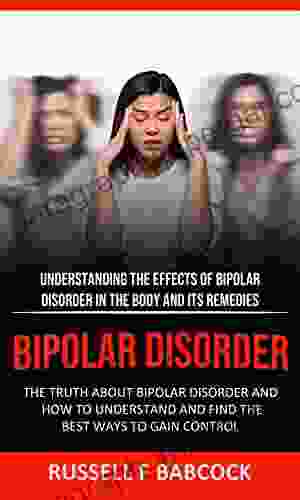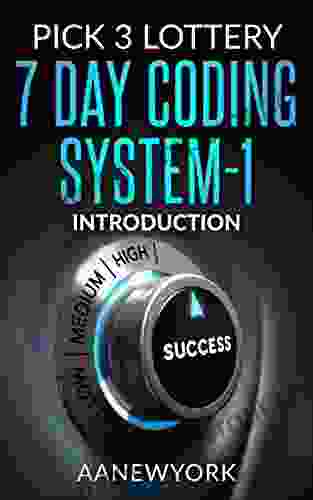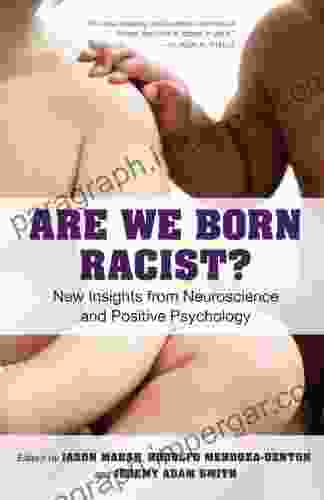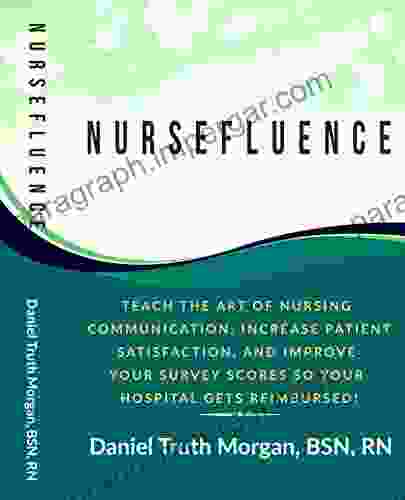Are We Born Racist? Unraveling the Complexities of Racial Bias

Racism, a persistent and pervasive blight on our society, has plagued humanity for centuries. Its tentacles reach into every corner of our world, shaping our interactions, institutions, and even our own self-perceptions.
But where does racism originate? Is it an inherent part of our human nature, a fundamental flaw woven into the fabric of our being? Or is it a learned behavior, instilled in us by our experiences and surroundings?
4.4 out of 5
| Language | : | English |
| File size | : | 252 KB |
| Text-to-Speech | : | Enabled |
| Screen Reader | : | Supported |
| Enhanced typesetting | : | Enabled |
| Word Wise | : | Enabled |
| Print length | : | 161 pages |
In this article, we delve into the complex and multifaceted nature of racism, exploring the question "Are We Born Racist?" We will examine the role of social, cultural, and biological factors in shaping our attitudes towards race, and explore ways to challenge and overcome racial bias.
Social and Cultural Influences
Racism is a social construct, deeply embedded in our social and cultural contexts. It is shaped by the beliefs, values, and norms that permeate our societies, often unconsciously influencing our thoughts and behaviors.
From a young age, we are exposed to racial stereotypes and prejudices, both explicitly and implicitly. Through media, education, and everyday interactions, we learn to associate certain racial groups with specific traits or characteristics, often perpetuating harmful generalizations.
Moreover, our social groups and networks can reinforce these biases. We tend to surround ourselves with people who share similar beliefs and values, which can lead to a confirmation bias, where we seek information that confirms our existing beliefs and disregard evidence that challenges them.
Biological Factors
While social and cultural factors play a significant role in shaping our racial attitudes, research suggests that biological factors may also contribute to our susceptibility to racial bias.
Studies have shown that the amygdala, a brain region associated with fear and emotion, responds more strongly to faces of individuals from different racial groups than to faces of individuals from our own racial group. This may underlie the initial fear and distrust that can accompany interracial interactions.
However, it is crucial to note that biological factors alone do not determine racism. They provide a potential foundation for bias, but our social and cultural experiences ultimately shape how these biological predispositions are expressed.
Child Development
The early years of life are a critical period for the development of racial attitudes. Children are incredibly receptive to their surroundings and can absorb cultural norms and biases from their parents, caregivers, and peers.
Research has shown that children as young as three years old can exhibit racial bias, favoring members of their own racial group over others. While some of this bias may stem from in-group preferences, it is also influenced by the racial attitudes and behaviors they observe in their environment.
Implicit and Explicit Bias
Racial bias can manifest in both implicit and explicit forms. Implicit bias refers to unconscious, automatic associations and attitudes that influence our behavior without our conscious awareness.
For example, an individual may have an implicit bias towards certain racial groups, leading them to subconsciously associate them with negative traits or stereotypes. This bias can influence their decision-making, even if they consciously believe they are not racist.
Explicit bias, on the other hand, is a more conscious and intentional form of prejudice. It involves overt expressions of racism, such as discriminatory behavior, hate speech, or violence.
Challenging and Overcoming Racial Bias
While racism is a deeply ingrained societal issue, it is not insurmountable. By understanding its origins and manifestations, we can take steps to challenge and overcome racial bias.
One key strategy is to become aware of our own biases. Implicit bias tests can help us identify our unconscious attitudes, allowing us to confront and challenge them.
Additionally, exposure to diverse perspectives and experiences can help break down stereotypes and foster empathy. Interacting with people from different racial backgrounds, reading books and watching films by diverse creators, and engaging in cross-cultural dialogue can expand our understanding and challenge our assumptions.
Education also plays a vital role in combating racism. Schools and other educational institutions can incorporate lessons on diversity, inclusion, and racial justice into their curriculum. By teaching students about the history and impact of racism, we can empower them to recognize and reject prejudice in all its forms.
The question "Are We Born Racist?" is a complex one that cannot be answered with a simple yes or no. While biological factors may provide a potential foundation for bias, our social, cultural, and developmental experiences play a significant role in shaping our racial attitudes.
Racism is a learned behavior, deeply ingrained in our societies and perpetuated through various mechanisms. However, it is a behavior that we can unlearn and overcome.
By understanding the origins of racism, challenging our own biases, and promoting diversity and inclusion, we can create a more just and equitable society for all.
4.4 out of 5
| Language | : | English |
| File size | : | 252 KB |
| Text-to-Speech | : | Enabled |
| Screen Reader | : | Supported |
| Enhanced typesetting | : | Enabled |
| Word Wise | : | Enabled |
| Print length | : | 161 pages |
Do you want to contribute by writing guest posts on this blog?
Please contact us and send us a resume of previous articles that you have written.
 Book
Book Novel
Novel Page
Page Chapter
Chapter Text
Text Story
Story Genre
Genre Reader
Reader Library
Library Paperback
Paperback E-book
E-book Magazine
Magazine Newspaper
Newspaper Paragraph
Paragraph Sentence
Sentence Bookmark
Bookmark Shelf
Shelf Glossary
Glossary Bibliography
Bibliography Foreword
Foreword Preface
Preface Synopsis
Synopsis Annotation
Annotation Footnote
Footnote Manuscript
Manuscript Scroll
Scroll Codex
Codex Tome
Tome Bestseller
Bestseller Classics
Classics Library card
Library card Narrative
Narrative Biography
Biography Autobiography
Autobiography Memoir
Memoir Reference
Reference Encyclopedia
Encyclopedia Jo Applin
Jo Applin Jerry Bergman
Jerry Bergman Jerrold Lee Shapiro
Jerrold Lee Shapiro Jeffrey Shandler
Jeffrey Shandler Jim Auchmutey
Jim Auchmutey Jennifer Moon
Jennifer Moon Joe Queenan
Joe Queenan Jerry Depew
Jerry Depew Jesse Braun
Jesse Braun Joan Swart
Joan Swart Jim Detert
Jim Detert Jerry Bram Walsh
Jerry Bram Walsh Jeffrey Powell
Jeffrey Powell John C Murray
John C Murray Jesse Kuhlman
Jesse Kuhlman John Baldoni
John Baldoni Jennifer Utrata
Jennifer Utrata Jeremy Clarkson
Jeremy Clarkson Jennifer Louissa
Jennifer Louissa Jefferson Bryant
Jefferson Bryant
Light bulbAdvertise smarter! Our strategic ad space ensures maximum exposure. Reserve your spot today!

 Jermaine PowellComputational Modelling of the Human Islet Amyloid Polypeptide: Springer...
Jermaine PowellComputational Modelling of the Human Islet Amyloid Polypeptide: Springer...
 Raymond ChandlerThe Truth About Bipolar Disorder: Understanding and Finding the Best Ways
Raymond ChandlerThe Truth About Bipolar Disorder: Understanding and Finding the Best Ways Hugh BellFollow ·10.7k
Hugh BellFollow ·10.7k Pat MitchellFollow ·9.1k
Pat MitchellFollow ·9.1k Herbert CoxFollow ·15.8k
Herbert CoxFollow ·15.8k Wayne CarterFollow ·14k
Wayne CarterFollow ·14k Vince HayesFollow ·12.9k
Vince HayesFollow ·12.9k Edwin BlairFollow ·13.1k
Edwin BlairFollow ·13.1k Charles DickensFollow ·4.2k
Charles DickensFollow ·4.2k Chance FosterFollow ·13.7k
Chance FosterFollow ·13.7k

 Christian Barnes
Christian BarnesUnleash Your Creativity: Build Interlocking 3D Animal and...
Discover the Art of Paper...

 Terry Bell
Terry BellUnveiling the Secrets of Winning: A Comprehensive Guide...
In the realm of chance and fortune, the...

 Albert Camus
Albert Camus101 Things That You Should Do Before Leaving The House In...
Starting your day right is...

 Anthony Burgess
Anthony BurgessForcing Move 2024 Volume: Unleash Your Inner Grandmaster
Embark on an extraordinary chess...
4.4 out of 5
| Language | : | English |
| File size | : | 252 KB |
| Text-to-Speech | : | Enabled |
| Screen Reader | : | Supported |
| Enhanced typesetting | : | Enabled |
| Word Wise | : | Enabled |
| Print length | : | 161 pages |












